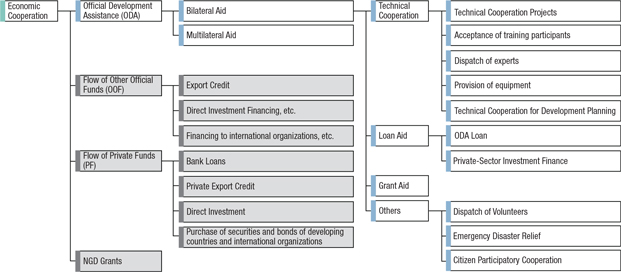Key Regional Initiatives
Southeast Asia and Oceania
While Southeast Asian countries have achieved high economic growth, disparities still persist within, and between, each country in the region. Given the region’s situation, JICA will address vast infrastructure needs, improve people’s connectivity through both hard and soft infrastructure, develop human resources to improve productivity and facilitate technological innovation, and work to support the formation of a peaceful and safe society. In addition, JICA will support development initiatives that are prevalent in the region, like disaster risk reduction, climate change mitigation and adaptation, and infectious disease control. Throughout its cooperation efforts, JICA will take into account its contributions to follow Japanese government policies, its commitments made at Japan-ASEAN summit meetings, as well as its partnerships with regional international organizations.
In Oceania, JICA will extend its assistance in addressing region-specific development issues in accordance with the Japanese government’s commitment at the Pacific Alliance Leaders Meeting (PALM). Priority areas will include addressing country vulnerabilities formed by natural disasters and impacts of climate change, as well as environmental issues that include waste treatment and water shortage concerns that have resulted from modernization and increasingly complex ocean issues.
South Asia
South Asia has the potential to become the center of the world’s economic growth, due to its young population and its vast consumer demands. However, the region also has the second largest impoverished population, next to Sub-Saharan Africa, and suffers from severe economic disparities, in addition to being highly vulnerable to natural disasters. Given the region’s situation, JICA will help develop foundations for the region’s economic growth, including the formation of a infrastructure, trade and investment environment; initiatives to secure the region’s peace, stability, and safety; practices to improve access to basic human needs; and methods to counter global issues like climate change and disaster risks. Throughout its cooperation efforts, JICA will take into account the needs of the region’s land-locked countries and look into ways to improve both hard and soft connectivity within the region and with other regions.
East Asia, Central Asia and the Caucasus
Since East Asia, Central Asia and the Caucasus have very strong geopolitical importance and a history of transitioning from a socialist to a market economy, it is important for JICA to help secure the region’s long-term stability and sustainable development efforts. Given the region’s situation, JICA will support initiatives to strengthen governance, industry diversification, as well as develop and strengthen infrastructure and human resource capacities. Throughout its cooperation efforts, JICA will take into account ways to improve intra- and inter-regional connectivity and resolve disparities.
Latin America and the Caribbean
While many of the countries in the region enjoy a certain extent of economic development, many of them also suffer from issues like poverty, economic and social disparities, and vulnerability to natural disasters. Given the region’s situation, JICA will support infrastructure development efforts, and initiatives like disaster risk reduction and tackling climate change, in collaboration with multinational development banks, to address global issues.
Also, JICA will continue to provide necessary support for Japanese emigrants and their decedents (Nikkei) in the region, in order to further strengthen ties between Japan and the region. Furthermore, JICA will strengthen its partnership and cooperation initiatives with Nikkei communities by providing support for Nikkei communities.
Africa
Africa is expected to form a large economy in the near future because of its rapid population growth. Therefore, continuous cooperation for Africa’s industrial development is important. However challenges persist, like the decline in commodity prices, the spread of infectious diseases, and the expansion of violent extremism. These challenges require cooperative solutions at the same time. Given the region’s situation, JICA, in collaboration with the private sector, will support regional infrastructure development like transport, water and sanitation, and access to energy, including renewable energy; as well as industrial development; business and investment climate development, including human resource development; and improving basic human needs. Throughout its cooperation efforts, JICA will also emphasize the three pillars of economy, society, and peace and stability, which have been declared as “Japan’s contributions for Africa”, pursuant to the 2019 Yokohama Declaration adopted at the Seventh Tokyo International Conference on African Development (TICAD7). Furthermore, JICA will not only promote country-specific, but also region-wide, initiatives focusing on improving regional economic communities.
Middle East and Europe
Many countries in the region still suffer from the aftermath of Arab Spring, in addition to Syrian refugees now becoming a global issue. Under such circumstances, in addition to emergency humanitarian assistance by the international community, it is necessary to extend support to communities hosting refugees and address structural problems in the mid to long-term that triggered the crisis to begin with, like poverty and unemployment. Also in Europe, the consolidation of peace and economic development are of the utmost necessity to ensure stability in the region. Given the region’s situation, JICA will provide assistance targeting efforts to reduce social and regional disparities, develop human resources and infrastructure, improve the region’s investment environment and maintain and conserve the region’s urban areas and natural habitats. Throughout its cooperation efforts, JICA will take into account its contributions to the Japanese government’s initiative called “Inclusive assistance towards the stability of the Middle East region”.
Particularly, in dealing with Syria and other refugee issues, JICA will collaborate with neighboring countries and international organizations, and it will carefully take into consideration the balance of benefits between the citizens of host countries and the refugees.
11
